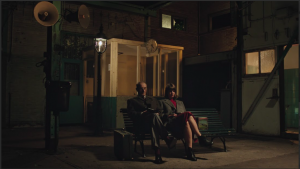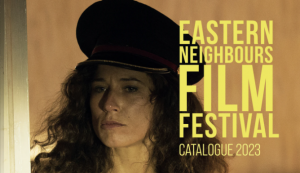
Success Has Not Erased Prejudices. A Fight for Equality Is Ongoing
Written by Tatjana Lisjak
The meeting with Alina Serban was scheduled for the evening before her performance at the National Theater Bucharest. She couldn’t hide the excitement although it was not a premiere. Her one woman show ‘’The Best Child in the World’’ had its opening in January but it has not been performed since, and this was the first time when an audience was allowed entrance without covid restrictions, codes and masks. The idea of getting back to a pre-pandemic normality feels quite extraordinary to her.
“In a way, it’s like a premiere. I didn’t have so many people in the room before and I couldn’t see their faces”, admits this outstanding woman of Roma origin, the first to become a Romanian director and to be admitted to the National Theater Bucharest. Although in the film industry for 13 years, international recognition came only in the last couple of years. Two years ago, the German Actors Guild Award gave her the Best Actress Award for the role of female boxer Ali in Huseyin Tabak’s ‘’Gypsy Queen’’. In 2018 she received another Best Actress Award at the International Roma Film Festival for a leading role in Martha Bergman’s ‘’Alone at My Wedding”, in which she also represented her country at the Cannes Film Festival. But success did not change her. She still faces the same problems and prejudice.
‘’The words we got for ‘’Gypsy Queen’’ were like a caress. A caress and recognition for immense hardship and impossibility of making such a wonderful dream coming true. Huseyin struggled so much to get funds because this was a story that was not exotifying or vilifying Roma women or the community. It was a story of their dignity and respect’’, tells Serban and continues: ‘’Luckily, against all odds, as in my private life, we managed to produce this movie thanks to our many allies who believed this story needed to be told. In the same way I managed to realize my film debut, the first historic documentary about slavery of Roma ‘’A Letter of Forgiveness.’’
Speaking of her private life, Serban is the one who knows very well what hardship and knocking on endless doors means. She arose from unfortunate circumstances. Her family was very poor and she ended up in foster care at the age of 16 after her mother was imprisoned. Still, she became the first person in her family to finish high school and then university, studying in Bucharest, New York and London. The difficulties and challenges of growing up were noted in her diary which she later published and used as an inspiration for her plays.
‘’It is a complex situation that leads a person to different things in different moments of life. I owe the most to my mother. The foundation of who I am and how I survived is thanks to her. She helped me believe that, no matter who we are or what the current reality may say, the only thing that matters is how I experience myself. And I didn’t feel less than my classmates. I could imagine everything great for myself because I deserved it, and keep my focus on what it could be and not what it is’’, she explains, admitting that she had some help on the way.
‘’You see, I was blessed by an army of angels I encountered on my path, like in a fable or a fairy-tale. People who helped me to overcome obstacles and who encouraged me to reach another path. This is how I am still living my life’’, says Serban with mixed emotions in the tone of her voice. You can feel a sound of gratitude but there is a pitfall. Doors are still hard for her to open.
“Yes, my resume can be proven, but I am not yet there to have any gain or leverage in the continuation of my career. There is no continuity, no stability. I can’t promise you that I will continue to do all this next year’’, she points out and reveals the most heart breaking realization: ‘’There are still limitations that the word Roma brings. I am not yet considered a director or actress in my homeland, but a Roma actress and a Roma storyteller. That is my reality. I have never been equal to a Romanian filmmaker and I never will be. Romanians have been seen in films and newspaper advertisements all their lives. They have the whole spectrum of the complexity of human experience. As a Roma woman and storyteller, I want to be able to join competitions and share stories like mine, and for my colleagues to realise how important it is to use that platform together.”
Unfortunately, she uses the same terms in describing her international success and everything she has experienced so far in the film industry, especially while making and promoting “Gypsy Queen”.
‘’Neither I nor Huseyin are famous or very important. We were underdogs. If my short film had been produced by a non-Roma person, and especially a white male, if ‘’Gypsy Queen’’ would have had a non-Roma actress in the main role, let’s say, a German one, and maybe not a Kurdish director, I think both films would then be in big, big places. Sadly, often quality is not what comes first but the name or marketing’’.
Yet, Alina hopes circumstances will change, ears will be more willing to hear than in the past.
‘’I hope there will be a shift and that selectors at film festivals will realize their responsibility. It is not really a question of the jury when the selectors do not choose different voices. And that’s my experience with my two short films. I want the world to see my films for what they are – equal, and on the same platform with other stories. I want them to be normalized. You see, I would never want to be chosen because I am a woman or a Roma woman. I do not agree with that. No! But when we have reached this point of undoubted artistic standard that a product has, then we must be direct in terms of privileges, about who will have the platform and who is sitting at the table. I haven’t been invited to the table yet.’’
Until that happens, Alina will continue to work with directors who will promote a unique Roma perspective and who will involve her in the decision-making process as Tabak did. The list of those she singled out as her mentors also includes some prominent names such as those of acclaimed Romanian new wave directors Radu Jude and Christian Mungiu, and producer Ada Solomon. Hopefully, her army of ‘helping angels’ will get a chance to rest in the future. After talking to her, it is hard to imagine that such a fighting and brave woman tomorrow could turn her back on such achievements. We can hope that her voice will be recognized and her projects will evolve with an ease she has never experienced before.
ROMANI STORIES BY ROMANI (FEMALE) DIRECTORS
18th – 20th March 2022
Kriterion Amsterdam | Filmhuis Den Haag









